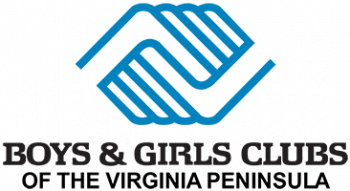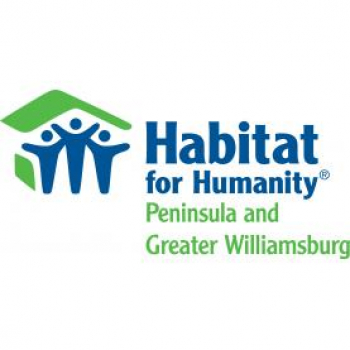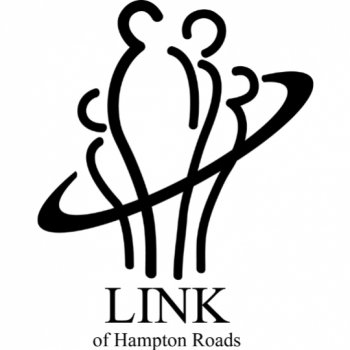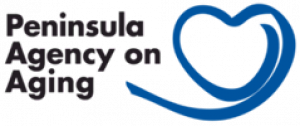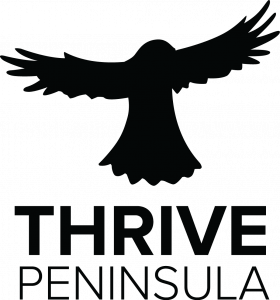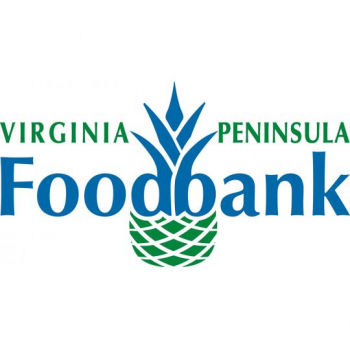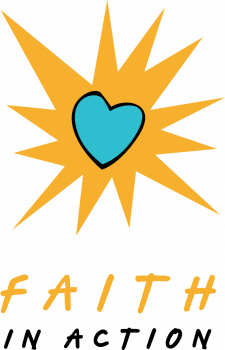
Agency Highlights
In the face of societal hardship, we reflect on the amazing work that is being done in the community by those fighting to improve the lives of everyone. As part of ALICE Awareness Week, United Way wants to shine the light on our partner agencies that, through thick and thin, have moved forward steadfastly to achieve positive change. Regardless of the obstacles they may face, these agencies are proving that anything is possible and that we are all UNITED for ALICE.
For more information on each agency, click on their logo!
|
The focus of Boys & Girls Clubs of the Virginia Peninsula’s (BGCVP) has changed from Youth ages 6-18 to ages 6-12 to serve those most in need. Despite the challenges presented, we have had success with our virtual programming. Our staff came together to focus on certain program areas of need. We also held SMART Girls and Passport to Manhood Zoom classes. We have encouraged healthy habits through our Eat Smart program and were able to hold a Sports Challenge at our Youth Development Park. |
Our mission is to inspire and enable all young people, especially those who need us most, to reach their full potential as productive, caring, and responsible citizens. The biggest part of that mission is “those who need us most.” These are the same kids that don’t have access to internet at home, are wondering where their next meal is coming from, or don’t have adequate seasonal attire. These are the kids whose parents are working double shifts and can’t afford to watch over virtual learning. Being able to provide a place for our youth that are most affected by the negative impacts of COVID-19 means we can help combat learning loss for at-risk youth. |
|
During 2020 the Scott Center served 25% more community adults than the prior year. This was attributed to outreach services provided during the onset of COVID-19. The Scott Center has changed its service delivery from on-site to community outreach, however, we continued to be available via telephone to answer calls regarding available community resources/services. This change in service delivery resulted in an increase in the number of community adults with which we engaged. Our outreach efforts also allowed us to provide paper copies of the local school system’s virtual learning packets to youth (1st-5th graders) of 15 households, who did not have the capability or resources to access such within their homes. |
For the C. Waldo Scott Center, “UNITED for ALICE” means working with other agencies to combine efforts and resources to serve a segment of the community: those who are doing the best they can with what they have but need a helping hand to overcome the challenges. |
|
Maria's Story When Alicia was four months into her pregnancy doctors told her that her baby had significant heart and organ problems. “We didn't know if Maria would live, or if she would ever be able to move or walk,” said Alicia. After four months in the hospital, Maria and her family returned home, and through CDR's Infant and Parent program, Maria received the individualized therapies she desperately needed. “Maria’s therapists would get down on the floor and show me how I could help Maria,” said Alicia. “I learned a lot of things, how to work with Maria and encourage her to thrive." Today, Maria attends school and is a busy 2-year-old who can walk, run, and enjoys playing as the junior chef in the kitchen. “CDR helped us so much, I am so grateful for the support my family needed.” |
Those living in ALICE, who are unable to save for a proverbial “rainy day,” have been left without a safety net. Their income was already inadequate to meet their essential needs for housing, food, transportation, childcare and other expenses. Layoffs, furloughs, reduced work hours and other disruptions to their income means that they face a yawning gap in income with little or no access to resources to fill that gap. Closures in childcare and virtual public schooling have been devastating to these families who are placed in the position of deciding between their child's care and education and their employment. Clearly this emergent situation is complex and needs a united response from our community. No one organization can meet all of the needs but together we can become the safety net that these families need. |
| The pandemic has exacerbated the already-great need for affordable housing, and as such, we’ve decided to press ahead, but with major modifications to the process. We modified the application paperwork to allow for faster initial processing and to require less documentation provided upfront. We expected to receive considerably fewer homebuyer applications during the pandemic, with so many challenges for us and our target audience. Typically, we receive approximately 100 applications a month. Yet, we were surprised to receive 150 applications in April! With a number that high, we are glad to have moved forward at the rate we did to meet the demand. |
Working with our local United Way, we are forging new relationships with community partners to identify opportunities and build strategies that support ALICE families. When ALICE households are forced to make difficult choices (housing, food, medicine, transportation, etc.) the entire community faces consequences. Working together, we can all highlight the issues faced by ALICE households and generate solutions that promote financial stability. |
|
Emergency Operations has continued to serve, removed all referral obstacles, and served anyone who called or came to the doors of LINK: for food, clothing, household items, blankets etc. “Gwen” called LINK for food support, referred by the Cancer Society. Gwen was on a fixed income and suffering from the effects of both cancer treatments and dialysis. We were able to purchase and deliver Heart Healthy ready meals and bottled water that she needed at a time when she couldn't get out of the house due to illness as a result of her treatments/dialysis. Gwen was so grateful to the people assisting her at the hospital and the community referring agencies, and it was an honor to help her in this time of hardship. |
Communication and a willingness to do what needs to be done for the clients has been a great success! LINK staff and some volunteers remain in contact with each other via text, phone and Zoom meetings. The LINK Emergency Services remained working with the help of a crew of volunteers. And with the external challenges, the staff are committed to adapting as needed. “UNITED for ALICE” means to us that we continue to work with people who have been marginalized due to under employment and now due to the pandemic. Working collaboratively is even more important now than ever before. |
|
Wendy Romero emigrated to the US from Honduras in 2005 in search of a better life. She spoke little English. She remembers, “I wanted to improve my English so I could be active and present for all my daughters’ activities.” Wendy’s English improved steadily, and eventually she decided to pursue high school completion. “I wanted to be an example to my daughters and also be able to get a successful job,” she reflects. Her writing improved significantly, and recently she successfully enrolled in the NEDP program, where she is making excellent progress. She plans to earn her diploma, pursue a degree in education, and become a teacher! We are thrilled, and we know she’ll be a great one! Wendy is grateful for the support she is receiving during her journey. |
“UNITED for ALICE” means offering maximum flexibility of services to adult learners whose busy work and family schedules make it difficult for them to attend onsite classes. It also means partnering with agencies in the community to offer wrap-around services that provide a pathway to a better career and the supports needed for success. |
|
Peninsula Agency on Aging is continuing to serve our seniors & their loved ones, any possible way we can. Creativity was needed & PAA met the challenge- reducing isolation and providing social engagement with “Porch visits.” One client, Mrs. A., lives alone and is feeling very isolated, so these porch visits are extremely valuable to her and other seniors in the community. Maintaining social distancing and proper care, we have been able to provide the social interaction that Mrs. A needed during this time. Diane Hartley, Vice President of Care Services with PAA, makes a “sidewalk” visit with our client, Mr. L., who lives on the second floor of an apartment building and was wanting to get some new CD's to listen to. Diane offered up her own collection and brought along 2 patio chairs. “We talked about music, his family, and where he hopes to work once it’s safe for him to be out,” stated Diane. Mr. L was very excited for the new CD's and a friendly visit with our PAA staff. |
For far too many families, the cost of living far exceeds their earnings and these households struggle with the most basic needs. When we all stand UNITED to provide supportive services to the Alice’s in our communities, we can create positive change. When COVID affected our local geographic area, our priority was to help mitigate the spread of the virus, especially among the most vulnerable population. Not only are seniors more susceptible to the disease, but keeping their financial, health and food security stable was and continues to be a priority. By leveraging staff and volunteers, we were able to make nearly 7,000 check-in calls between March-September to ensure the safety and overall health of the clients we serve and provide nearly 2,950 meal deliveries each week. Our staff is ensuring that those who are in need, whether it’s home delivered meals, trips to doctor’s appointments or simple wellness checks, that PAA is here to provide these supportive services or any additional resources that the senior population needs during this time. |
|
During a time when so many families are unexpectedly experiencing hardship, THRIVE is committed to providing increased services to families in crisis. THRIVE Peninsula is a faith-based coalition, helping Peninsula families through hardship with financial coaching, emergency rent and utility assistance, and food pantry services. Since March 2020, THRIVE has distributed 60% more food and 40% more rent and utility relief funds than last year during the same period. We have converted our food distributions and donations to a curbside pickup model and installed plastic sneeze guards inside the office to facilitate safe financial coaching sessions. |
On top of our regular services, between April – October, THRIVE has provided over 100 weekly bags of food to homeless families staying in hotels, waiting to be housed. Starting in mid-October, THRIVE will provide hot meals three times a week in a drive-through distribution. THRIVE is also partnering with the United Way and other agencies to facilitate the HEPP program, which offers rent and mortgage relief to Hampton residents who have lost income due to COVID-19. ALICE families are not alone. We see you and we will do everything we can to support your journey and lift you up. |
|
In the absence of many of our partners, the Foodbank has greatly expanded upon our normal service. We started holding no contact drive-thru mobile pantries up and down the greater Peninsula. We purchased much more food than ever before because of the decrease in donations from retailers. We went to locations where the children did not have access to the school system meals. |
When COVID hit, many additional households were unemployed, and we served three times as many households in April and May 2020 as we did during April and May 2019. Because of the differing experiences every individual is having, we have many stories from our mass food distributions. For instance, one woman was working 3 part-time jobs prior to COVID; she got laid off from all 3 jobs and we were able to help her. Another woman at a mobile pantry had not been working at her job long enough to qualify for the added unemployment. The only way forward is working together to take care of our community, and that’s what “UNITED for ALICE” means to us. |
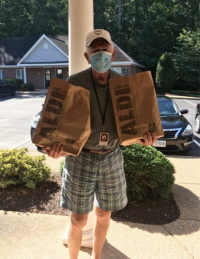
|
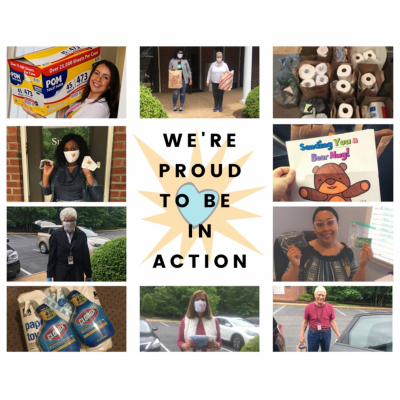
|
|
To address the overwhelming issue of finding supplies like toilet paper, cleaning products, etc. due to the shortage at the beginning of the pandemic, we started Supplies for Seniors. We collected hundreds of items - including toilet paper, paper towels, masks, cleaning products, soap, etc. - and had volunteers willing to help pick them up from the office and drop them off at the care receiver's door. This program was overwhelmingly successful and truly met a need in our community. Since many of our care receivers utilized our transportation to get to the grocery store, we knew we had to help meet that need, too. We expanded our Food program to be “Food Security for Seniors” and included grocery online ordering and delivering, food pantry delivery, and freezer meals for those living in hotels or who were unable to cook for themselves. |
“UNITED for ALICE” means meeting our community members where they are at and doing whatever we can to support them while they aim to support themselves. In early March, Sharon, age 63, was diagnosed with cancer. She started with Chemotherapy almost immediately and was safely getting there with the help of WFIA volunteers. Not knowing when transportation could resume though, Sharon was forced to get creative. Not only was riding with private companies a financial burden, but they exposed her to conditions potentially unsafe for her health. Most of all, they lacked the caring and personal component WFIA is known for. We began assisting Sharon with contact-less services like food pantry and prescription delivery, wanting to be there for her in whatever way we could be. This is just one of the success stories we were able to be a part of during the pandemic. |

